Peace "Karuta"
Conveying our wishes to the world
The new year, 2011, will be arriving. Who will you spend your New Year's Day with and what will you do? For this issue, the junior writers have created "Karuta" cards on the theme of "peace" so you can reflect on peace as you play cards together.
"Karuta" is a traditional Japanese card game that is played, in particular, at New Year's time. There are two kinds of cards: the "reading cards," which have only writing on them, such as a short poem, and the "picture cards," which have a picture on them. Each reading card has a corresponding picture card to make a match. To play the game, one person reads out the reading cards, one by one, and the other players search for the matching picture cards. The short poems on the reading cards usually start with characters from the Japanese "hiragana" syllabary.
For the reading cards, the junior writers described the peace that can be found in our everyday lives, such as the tender feeling of cherishing a small flower and singing a song. Some of our reading cards also deal with unstable conditions in the world which may lead to conflict or accidents that frequently occur as a consequence of landmines. In addition, we asked people who are engaged in efforts involving Hiroshima, such as those who share A-bomb accounts or work for peace, to create short poems for the reading cards, too. The picture cards were drawn by a former junior writer.
 |
"The crack of white baseballs, echoing forever in the blue sky"
Takahiro Iwamoto, 24, baseball player for the Hiroshima Toyo Carp |
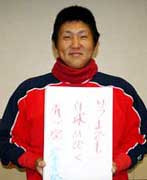 Takahiro Iwamoto holds his reading card. (Photo taken by Shiori Kusuo, 17) |
|
I wrote this reading card with the wish that the world will be a place where baseball can always be enjoyed. I was born in the city of Hiroshima and took part in a peace education class when I was a child. When I visited Peace Memorial Museum for the first time, I remember feeling frightened by the exhibit of the human shadow that has remained on the steps to the entrance of a bank. That experience left a lasting impression.
I lived with my grandparents, who were both A-bomb survivors. When I was in elementary school, I saw the scars on their bodies and it made me feel that atomic bombs should never be used again.
I think peace is a world without poverty and war. Children suffer the most harm from these things. We should be grateful for the fact that we can grow up without feeling fear or insecurity.
(Shiori Kosaka, 15, and Masaya Obayashi, 14)
| Takahiro Iwamoto graduated from Hiroshima Prefectural Commercial High school and Asia University. In 2009 he joined the Hiroshima Toyo Carp, Hiroshima's professional baseball team. He played 61 games in 2010 and his batting average was .259. He also hit 14 home runs and had 36 RBI. |
|
 |
"Growing up healthy, becoming global citizens in the future"
Hidehiko Yuzaki, 45, Governor of Hiroshima Prefecture |
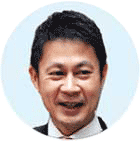 |
|
Sixty-five years have passed since the end of World War II and the atomic bomb survivors are growing older. I hope the young people of today, who will be leaders of the next generation, grow up with an accurate understanding of world affairs and make contributions for peace. For youth in Hiroshima to become "global citizens in the future," it's important to learn about the atomic bombing. In order to achieve mutual understanding with others, knowing about the history of the place we were born and raised is vital.
When I was a high school student, I studied abroad in the United States. Through my experience there, I learned that human beings are all basically the same, regardless of our differences involving ethnicity and culture. We shouldn't hold prejudice against people who are different from us. I hope young people will look closely into the heart of the world around them and ponder the things that are truly important.
(Mako Sakomoto, 14, Rena Sasaki, 14, and Masataka Tanaka, 16, who also took the photo)
| Hidehiko Yuzaki was elected Governor of Hiroshima Prefecture in November 2009. Previously, he worked at the Ministry of International Trade and Industry (now, the Ministry of Economy, Trade and Industry) and as the vice president of a communications company. He is the father of two boys and a girl. |
|
 |
"The A-bombed piano, a messenger of peace, crossed the ocean to visit New York"
Mitsunori Yagawa, 58, piano tuner of an A-bombed piano |
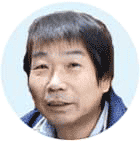 |
|
While working as a piano tuner, I encountered a piano that survived the atomic bombing. I was shocked at the realization that human beings weren't the only A-bomb sufferers. I thought that the piano would desire to convey the idea of peace through musical performances and so I started organizing concerts with the A-bombed piano in 2001. To date, I've held more than 500 concerts. I've also tried to maintain the instrument's original parts so the piano can continue to sound as it did in the old days.
In the terrorist attacks of September 11, 2001, New York suffered serious damage and there were many victims. I traveled to New York with the A-bombed piano to share the city's sorrow with Hiroshima. We held a concert in a park by the Hudson River and more than a thousand people gathered for the event.
My father was exposed to the atomic bomb at a spot about 800 meters from the hypocenter. My grandparents were affected by the bomb's radiation when they entered the city in the aftermath of the blast, and my mother was caught in the black rain.
My hope is that nuclear weapons will be eliminated and that the A-bombed piano will no longer be needed for performances.
(Seira Furukawa, 17, and Arata Kono, 13; photo taken by Yusuke Suemoto, 14)
| Mitsunori Yagawa organizes concerts with the A-bombed piano while continuing his work as a piano tuner. He is also engaged in an effort to donate second-hand pianos to developing countries. |
|
 |
"Still there is war, still there are children who don't know peace"
Four children at Peace Village International in Germany |
|
|
The reading card we made contains our wish to live at peace in our homeland, Afghanistan.
"War" is a state in which people are fighting. "Peace" is a state in which, free from worries, we can play with our friends. We want to communicate the fact that there are many children in the world who are suffering because of conflict.
At Peace Village International, we can enjoy learning many kinds of things with children who come from other countries. If we return to Afghanistan, we want to go to school.
In the future, our dreams include "becoming a doctor," "going to school," and "working at a peace village in Afghanistan for children who are suffering."
(Chisa Nishida, 16, Yuumi Kimura, 14, and Sachiko Kitayama, 14; photo is courtesy of Peace Village International)
縲
| The four Afghan children range in age from 10 to 12. They suffer from a variety of health concerns, including burns and diseases, and are receiving medical treatment for these ailments. |
|
| Peace Village International in Germany This nongovernmental organization was established in 1967. It provides medical treatment to children who have been hurt in conflicts or through other circumstances, and then returns the children to their home countries. The headquarters is located in the city of Dinslaken in Germany and the village is in neighboring Oberhausen. At the village site is a street called "Rua Hiroshima" ("Hiroshima Street"), its construction initiated by a staff member who visited Peace Memorial Park in Hiroshima seven years ago and was very moved by the experience. Currently, 282 children from such nations as Angola, Armenia, and Georgia are residing there. |
|
 |
"Kindness in a pressed leaf bookmark arrived in winter"
Miho Cibot, 61, peace activist in France |
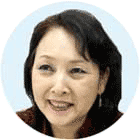 |
|
I received a letter from a friend who lives in Hiroshima and inside I found a pressed yellow ginkgo leaf, a bookmark. The leaf reminded me of the hard work we put in on a peace activity the two of us were involved in more than 20 years ago. The kindness I felt from my friend in that leaf warmed my heart.
I don't think the United States and France are right in their insistence that peace can only be kept thanks to the existence of nuclear weapons. A lot of people have been harmed by nuclear testing and the environment has been contaminated, too. The production of nuclear weapons is itself an evil. Nuclear weapons should be eliminated in order to make the world a more peaceful place.
(Mei Yoshimoto, 14; photo taken by Shiori Kosaka, 15)
| Miho Cibot is an adviser for Mayors for Peace France (AFCDRP). She moved to France in 1975. In 1982, she established the "Institut Hiroshima Nagasaki" (Hiroshima-Nagasaki Research Institute). She is married to a Frenchman and has a son and a daughter. |
|
 |
"Pledging to challenge myself, I became a messenger of peace"
Sadae Kasaoka, 78, atomic bomb survivor |
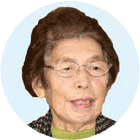 |
|
To realize peace, it's important to have a positive attitude in order to interact and communicate with people who hold different opinions. When we overcome various difficulties and continue our efforts, we can be "messengers of peace." Achieving a world without war and nuclear weapons requires that we join forces and work together. Toward that end, I want as many people as possible to understand how "evil" the atomic bombs were. I want the children of Hiroshima to convey the city's experience when they grow up and go out into the world.
I share my experience of the atomic bombing with students visiting Hiroshima on their school trips. Young people have the power to change the world. Most of all, I want the younger generation to hear my message.
(Minako Iwata, 17; photo taken by Saaya Teranishi, 14)
縲
| Sadae Kasaoka was exposed to the atomic bomb at a location 3.5 km from the hypocenter. Her parents perished in the blast. She now serves as the chairperson of the Hiroshima council of the Girl Scouts of Japan. |
|
|  縲 縲 | The junior writers have created "Karuta" cards |  縲 縲 |
|
 |
"Paper cranes, a bridge to a peaceful world"
|
|
Paper cranes are a symbol of Hiroshima's experience of the atomic bombing and can be used to convey the idea of a peaceful world in a tangible form. I would like as many people as possible, of all generations and nations, to know about the tragedy of the atomic bombing. (Yuumi Kimura, 14)
|
|
 |
"A chorus of peace, ringing high into the sky"
|
|
To make the whole world a peaceful place, every person needs to be strongly mindful of that goal. Let's sing out our wish for peace and have it ring high into the sky. (Sachiko Kitayama, 14)
|
|
 |
"No more landmines, no more tragedies, instead more smiles"
|
|
Almost every day, a lot of people and animals are hurt by landmines. It's gotten to the point that they don't even feel safe to step on the ground. I want this terrible situation to end so there are smiles instead of crying faces. (Chisa Nishida, 16)
|
|
 |
"A flower by the road smiles at me"
|
|
One day I happened to see a small flower. Though it had been trampled on, it still stood tall, bathed there in the sunshine. I know I'll encounter many difficulties in my life, but I want to live with strength, like that flower. (Shiori Kosaka, 15)
|
|
 |
"The world spins like a roulette wheel; what will tomorrow bring?"
|
|
World conditions are changing fast, like a spinning roulette wheel. I see roulette as a metaphor for the world where, if there's a spark of some kind, the roulette ball will stop on the Korean Peninsula or the Middle East and war will break out. (Yuka Ichimura, 14)
|
|
 |
"Traveling through Hiroshima, the city of peace, by streetcar"
|
|
Streetcars play an important role in transporting people through the city of Hiroshima. The cars of two streetcars that were running on the day of the atomic bombing are still operating in the city. I suggest riding on these streetcars and visiting A-bombed buildings. (Arata Kono, 13)
|
|
 縲
縲
 縲
縲
















